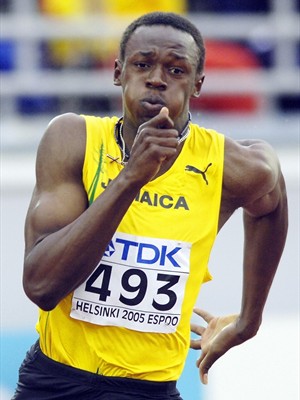 Usain Bolt is calling it quits for 2010, cutting his season short because of
tightness in his lower back less than a week after losing in the 100 meters to
American rival Tyson Gay.
Usain Bolt is calling it quits for 2010, cutting his season short because of
tightness in his lower back less than a week after losing in the 100 meters to
American rival Tyson Gay.Bolt’s manager, Ricky Simms, wrote in an e-mail Tuesday that the world record-holder at 100 and 200 meters will have treatment to loosen his back and then rest, skipping IAAF Diamond League track and field meets in Zurich on Aug. 19, and Brussels on Aug. 27.
“I am very disappointed to miss two of the top meetings on the circuit … but trust that it is better for me not to take any risks this year,” Bolt said, according to Simms. “2011 and 2012 are very important Championship years and I hope to be back fully fit and healthy. I would like to thank everyone for their support and look forward to coming back stronger next year.”
Simms said Bolt was examined Monday by a doctor in Munich who found the back problem.
“He has a tightness that restricts his ability to generate power in his stride and continuing to race in this condition could risk injury to his hamstrings or calf muscles,” Simms wrote.
Bolt’s manager said the decision to take a break was made “with a view to his future career.”
Simms also said that an MRI exam showed that a previous left Achilles’ tendon injury is healed.
“We wish Bolt, who has had a long history of back trouble, a speedy recovery and look forward to seeing his incredible talent delight us all once again next season,” IAAF spokesman Nick Davies wrote in an e-mail Tuesday.
Bolt hadn’t lost an individual race in two years until Friday, when Gay beat him at the DN Galan meet in Stockholm. Gay ran 9.84 seconds, and Bolt finished in 9.97.
Afterward, even Gay acknowledged he wasn’t racing against a fit Bolt.
“I’m really happy with the win,” Gay said at the time, “even though Usain Bolt isn’t in the best shape.”
After Bolt’s announcement Tuesday, Gay posted his reaction to the news on Facebook.
“I wish Usain the best as he gets healthy for 2011 and 2012. I would have liked for us to race again this year, but it didn’t work out,” Gay said. “I’ve had my own injuries in the past, so I understand his decision as well as anyone.”
When Bolt is at his best, no one comes close to him. And no one else in his sport is as big a draw.
“He is the most known athlete we currently have, and he’s definitely someone that the public asks for,” said Patrick Magyar, the director of Zurich’s Weltklasse meet and vice chairman of the Diamond League. “If he was just not in the best of shape, he would still have come, but he is obviously at risk of hurting his body—and nobody wants that to happen.”
The Jamaican stole the show on the track at the 2008 Beijing Olympics, winning gold medals and breaking the world records in the 100 and 200 sprints, as well as the 400 relay. None of the finals in those events was even close, and Bolt began his celebration in the dash before it was done, stretching out his arms with palms up, then slapping his chest.
He followed that up at last year’s world championships in Berlin by lowering his marks in the 100 to 9.58 seconds and in the 200 to 19.19.
“Usain’s had such an enormous impact on track and field. … It’s regrettable he can’t be there,” said Bob Verbeeck, CEO of the Brussels meet. “We wish Usain a fast recovery.”
The next outdoor world championships are in Daegu, South Korea, in August 2011, and the 2012 Olympics are in London.
The IAAF is “of course saddened when any athlete, not just a star of Usain Bolt’s immense athletic brilliance, is forced to retire from a season due to injury,” Davies wrote, “but that is the reality of elite sport especially one as physically demanding as track and field.”